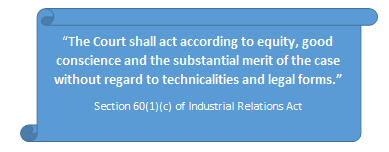Court / Referee Hearing
Depending on the type of hearing you attend, Court hearing or Referee Hearing, the constitution of the court will be different.
The President of IAC alone will hear and determine disputes relating to:
- Continuation of a collective agreement (CA) or award
- Interpretation of a CA or award
- Setting aside or varying any of the terms of a CA or award
- Non-compliance with a CA or award or contravention of any provision of the IR Act
- Decision of the Referee where the dispute was first heard by a Referee
- Dismissal of employee allegedly due to industrial action
The Court, comprising the President of IAC and a member each from the Employer Panel and Employee Panel selected by the employer and union respectively, will hear and determine disputes relating to:
- Any terms and conditions of employment
- Annual Wage adjustments, AWS or bonus
- Transfer of employment
- Retrenchment benefit payable to executive or breach of his contract of employment
The Employer Panel and the Employee Panelare established under the IR Act. The members of the Panels are appointed by the Minister for Manpower, based on recommendations from the Singapore National Employers' Federation and the National Trades Union Congress.
Referee Hearing
Referees are appointed by the Minister for Manpower under the Industrial Relations Act. With a few exceptions, CAs invariably provide for selection of the Referee by the President of IAC to determine disputes arising out of the operation of the CA.
Be as well prepared as you can be for your hearing. This page takes you through the action you need to take, the documents you need to submit and the time frame.
- Prepare your documents for submission to IAC
- statement of issues and summary of arguments in writing
- copies of any correspondence and other documents to support your case
- Confirm with the Registrar of IAC
- the number of copies of documents to be submitted
- the date you need to appear at IAC to submit your documents to IAC and exchange with the other party.
- Submit documents to IAC on the scheduled date
** Presentation slides or further documents to be used on the day of the hearing should be provided to the Court and the other party at least 4 working days before the hearing.
If it’s your first time in court, it helps to know what to expect, when you will be able to present your case and when you can expect to learn of the outcome.

The Court is not bound by the Evidence Act and may enquire into a matter in any way that it thinks just.
In order to achieve a quick and just hearing, the Court may:
- summon you, the other party and witnesses to appear.
- ask you to give evidence under oath.
- compel you or the other party to produce documents and materials.
- conduct its proceedings or any part of its proceedings in private.
- give any necessary directions and conduct the hearing at its discretion, subject to the provisions of the IR Act.
Representation
The IR Act prohibits representation by a practising lawyer or paid agent except where the matter relates to contempt of court.
- The union may be represented by an officer of the union or by an industrial relations officer selected by the union.
- The employer may be represented by an employee or by an officer of the union to which the employer belongs.
Hearing Proceedings
- You and the other party will take turns to present your full arguments to the Court.
- The Court may ask for clarifications and for further information wherever necessary.
- At the conclusion of the hearing, the Court may adjourn to deliberate on the dispute and may give its decision either on the same day or another day, depending on the circumstances of the case.
Practice Direction for Proceedings at the Court Hearing
What to Expect during Referee Hearing Proceedings
- You and the other party will take turns to present your full arguments in detail to the Referee.
- The Referee may ask for clarifications and for further information wherever necessary.
- You will receive the Referee’s decision within 3 weeks of the hearing either in writing or you will be asked to return to the Court to hear the decision in person.
A Court hearing decision is final and cannot be appealed. However, you do have recourse to appeal in the case of Referee hearings.
If you are dissatisfied with the whole or part of the Referee's decision, you may appeal within 14 days from the date of the decision as follows:
- File a Notice of Appeal with IAC and pay a fee of $2. The modes of payment available will be advised to you by IAC at the point of payment.
- Hand a copy of the appeal to the other party (the Respondent).
- Purchase the Referee's written grounds of decision and the transcript of the hearing, when you are advised that they are ready, at the following fees:
- The written grounds of decision - $50
- The transcript - $2.50 per page
- Review the written grounds of decision and the transcript of the hearing.
| If you decide not to proceed with the appeal |
|
| If you decide to proceed with the appeal |
|